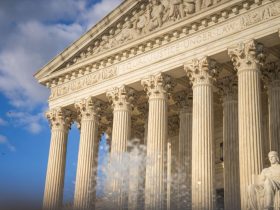Florida’s education department had been privately complaining to the College Board for months about a new Advanced Placement African American Studies course before the board released revisions that critics saw as caving to political pressure, according to a timeline released by the state.
The complaints, outlined in a letter this week to the College Board, feed into an ongoing debate over whether the organization submitted to pressure from Florida Gov. Ron DeSantis (R), who has made battling curriculums he considers too liberal or “woke” a signature cause.
Still, while the letter said the department was “grateful” to see the changes in the course plan, officials said the state has not yet decided whether to approve the course — which covers a range of topics related to Black history and culture — and demanded more information about it.
The College Board, a nonprofit organization that oversees the AP program and the SAT, piloted the course in about 60 high schools this year, including at least five in Florida. It will be available nationwide by fall 2024.
The College Board says revisions it made to the course were part of its normal review process and says they were not related to Florida’s complaints. In making their case, College Board officials noted that the revision process is a lengthy one and said it could not have been prompted by concerns that surfaced publicly in January.
The new timeline detailed in the Florida education department’s letter attempts to undercut that argument and take credit for the revisions by listing several conversations between July and December where Florida officials raised concerns that the curriculum violated the state’s contentious new law banning discussion of certain topics related to race in K-12 schools.
College Board officials said in an interview Thursday that Florida officials never gave details about these concerns, so they were unable to share any feedback with the scholars revising the course framework. They said they repeatedly asked for a list of objections and were never given one.
“We did not pass on the inchoate and unclear questions Florida asked about the content of the course in those brief telephone conversations,” Trevor Packer, who heads the Advanced Placement program for the College Board, said in an interview. “Those conversations were unsubstantial in their academic content and clarity.”
Packer added that questions posed revealed a lack of understanding about the topics at hand, such as whether the course would indoctrinate students into “Black Panther thinking.”
Nonetheless, the College Board did make a range of revisions to the course, which have been criticized in progressive circles as an infringement on academic freedom and a surrender to political pressure. Conservatives celebrated the changes as a victory, and the episode has bolstered DeSantis’s profile as an aggressive warrior in today’s culture wars.
The state’s timeline was included in a letter to a College Board official Tuesday. Among the communications detailed were a July 1 email from a state official raising concerns about the class: “The preview materials appear to include content that may not be permissible. In order for the review to continue, we need information from College Board that demonstrates teaching the content would not require teachers to be out of compliance with Florida law.”
A College Board official replied that the course did not conflict with Florida law. But in September, after reviewing the material, the state said that it did.
The parties met in November and, according to Florida’s timeline, state officials detailed their concerns at that session. At that meeting, according to the state, the College Board explained that the course would undergo revisions but said topics including “systemic marginalization” and “intersectionality” were “integral elements of the course and could not be removed.”
Packer said no one from the College Board called any element of the course “integral.”
The College Board did revise its treatment of both of these ideas.
The framework used for this year’s pilot course, which was distributed last summer, included an examination of intersectionality, which considers how different identities combine to impact someone’s experience — such as being Black and female. One of its weekly focus topics was “Black Feminism, Womanism and Intersectionality.” In the final version, intersectionality is included only as an example of a possible project that a student might choose.
The pilot version included terms such as systemic marginalization, systemic oppression and systemic discrimination nine times. But the word “systemic” does not appear at all in the final framework.
Packer said the College Board wanted the course plan to include concrete examinations of systemic discrimination rather than “abstract language.” For instance, students will look at discrimination in distribution of GI Bill support for veterans and be asked to “describe the enduring forms of segregation and discrimination in daily life that African Americans faced in the first half of the 20th century.”
The letter from Florida, which was first reported by the Daily Caller, lists 19 subjects that it says were removed from the framework. The office said it was grateful for the changes, which it took credit for by saying the revisions came about “by no coincidence.”
Packer, from the College Board, disputed that account.
But the College Board did remove the mention of several hot-button topics that are part of the pilot program. That includes lessons on Black Lives Matter, reparations for the harms of slavery and racial discrimination, as well as suggested readings from left-leaning notables such as scholar Kimberlé Crenshaw, an architect of critical race theory. The organization has said the topics are not barred from the course.
In a reply letter sent Wednesday to the Florida Department of Education, the College Board again stated that its changes were not made in response to Florida’s complaint.
“As is always the case in AP, our selection of topics for this course has been guided by feedback from educators, disciplinary experts, and principles that have long shaped AP courses,” the College Board wrote. It said that it is standard practice to reduce the number of topics after the pilot version of the course debuts.
The organization added that “no topics were removed because they lacked educational value,” as Florida has charged. “We believe all the topics listed in your letter have substantial educational value.”
Florida’s education department also requested this week that the College Board provide more information about free resources it intends to make available to all on Black studies topics. The College Board has said it has sought copyright permission to distribute a range of secondary source text from authors and scholars, including Crenshaw, Ta-Nehisi Coates and James Baldwin.
In the meantime, controversy continues to rage over Florida’s resistance to the course as well as the College Board’s actions.
Five schools in four Florida districts offered the pilot course for this academic year; after the state’s objections were announced in January, the district with two participating schools ended the course.
Civil rights attorney Ben Crump has threatened to sue the Florida Department of Education if the curriculum is not approved and made available to Florida students.
“If the DOE and Governor DeSantis attempt to censor and silence materials that the College Board experts believe are necessary to accurately teach Florida students, then we will follow through on our promise to protect Florida students from the Governor’s whitewashed version of history and violation of the state and federal constitutions,” said Tampa attorney Craig Whisenhunt, who works with Crump and joined him in Tallahassee on Jan. 25 at a “Stop the Black Attack” rally to protest the state’s decision to reject the course. “Just because he doesn’t like other points of view doesn’t mean he gets to exclude them from the classroom.”
Nick Anderson, Lori Rozsa and Valerie Strauss contributed to this report.








